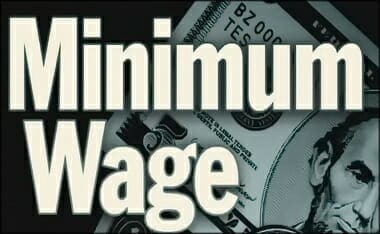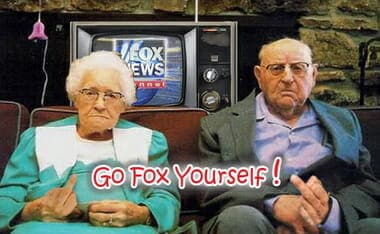(I am changing some of my “Pages” to “Posts,” so some of this info is older to my site)
The above video is a good one-two-three punch explanation that is concise and short!
These people must be crazy! When there is near [damn] consensus on a topic… people should know about it, especially when the raising the minimum wage hurts the black community. But the left thinks and rants that not raising minimum wage is hurting the poor and minorities… when it is the exact opposite. What a crock!
Hurting the Poor
Thomas Sowell (left) and Walter Williams (right) explain the negative effects of the minimum wage.
(Minimum wage laws make discrimination on ethnicity and gender easy, via Milton Friedman) Here is Walter Williams referencing some statistics to make his point (including Neumark), followed by the excellent lead-up to the debate between [included as well] between L.A. Times columnist, Michael Hiltzik, and professor of economics at UC Irvine, David Neumark:
….University of California, Irvine economist David Neumark has examined more than 100 major academic studies on the minimum wage. He states that the White House claim “grossly misstates the weight of the evidence.” About 85 percent of the studies “find a negative employment effect on low-skilled workers.” A 1976 American Economic Association survey found that 90 percent of its members agreed that increasing the minimum wage raises unemployment among young and unskilled workers. A 1990 survey found that 80 percent of economists agreed with the statement that increases in the minimum wage cause unemployment among the youth and low-skilled. If you’re looking for a consensus in most fields of study, examine the introductory and intermediate college textbooks in the field. Economics textbooks that mention the minimum wage say that it increases unemployment for the least skilled worker.
As detailed in my recent book “Race and Economics” (2012), during times of gross racial discrimination, black unemployment was lower than white unemployment and blacks were more active in the labor market. For example, in 1948, black teen unemployment was less than white teen unemployment, and black teens were more active in the labor market. Today black teen unemployment is about 40 percent; for whites, it is about 20 percent. The minimum wage law weighs heavily in this devastating picture. Supporters of higher minimum wages want to index it to inflation so as to avoid its periodic examination….
From the video description:
Larry Elder has on an L.A. Times columnist Michael Hiltzik on to defend his statements made in the column*, as well as professor David Neumark to debate some of the finer points. I do include the build up to the interview/debate, which includes and evisceration of anything deemed moderate at the L.A. Times — pointing out the bias lays firmly on the political-left.
More by Walter Williams:
How will the forced raising of the minimum wage hurt the poor?
As the #FightFor15 movement get fast food workers to strike in order to get a $15, and they watch businesses in Seattle closing because of the forced raise in wages. Automated cashier options are now an option to be weighed. Of course a business wants a human face to represent it. But the business wants to stay in business, so many are being forced to choose a cheaper, more sustainable option for its budget.
McDonald’s is buying 7,000 automated machines to replace people
Would you like some microchips with that burger? McDonald’s Europe strikes another blow against human interaction by installing 7,000 touch-screen computers to take your order and money.
[….]
McDonalds recently went on a hiring binge in the U.S., adding 62,000 employees to its roster. The hiring picture doesn’t look quite so rosy for Europe, where the fast food chain is drafting 7,000 touch-screen kiosks to handle cashiering duties.
The BELOW is and update to the above story about MceeDee’s in Seattle:
Via BizPic!
While it seems liberals may think that raising the minimum wage will raise living standards for poor Americans, they should have seen this coming.
With Los Angeles joining Seattle in setting a $15 minimum wage (Los Angeles by 2020, and Seattle by 2021), it stands to reason that McDonald’s would find a way around simply paying workers more, as Vox pointed out the obvious fact that “the reality is that McDonald’s just wants to make money.”
In a very real-world example of big business’ response to liberal policies, a conservative Twitter user sent Labor Day wishes from McDonald’s workers whose minimum wage never goes up.

And this real world affect of what politicians can merely raise taxes to meet budgets with (or, on the Federal level just print more money [a dumb move BTW]) is that small business go out of business, thus affecting the poor who want jobs.
But now the option through technology is to replace workers for businesses altogether:
(Washington Policy Center) Everyone is predicting what the real world impact of Seattle’s newly passed $15 minimum wage will be. The truth is there will not be a mass exodus of businesses from the city, nor will the economy crash.
Certainly, some businesses will move or close down, consumers will pay more, some workers will receive fewer benefits and the lowest skilled workers will have a harder time finding a job because they are competing with more experienced workers.
But many businesses will simply figure out how to employ fewer low-wage workers. They will do that by substituting machines and technology for people.
Service industry CEOs have cautioned a higher minimum wage is “encouraging automation,” which can improve efficiency. Even Microsoft co-founder Bill Gates warns that a higher minimum wage would “encourage labor substitution” and incentivize employers to “buy machines and automate things” and ultimately “cause job destruction.”
He’s right. When government increases the cost of labor, employers find other ways to save money.
Just look at how McDonald’s has responded to France’s $12 an hour minimum wage. In 2011, McDonald’s invested in 7,000 touch screen computers in France to reduce the number of workers needed. Restaurants around the country are already exploring automation as a means to cut costs; Applebee’s is installing 100,000 tabletop tablets for ordering and payments.
Many food businesses are considering a machine that can freshly grind, shape and custom grill 360 gourmet burgers per hour, no human labor needed. Alpha, the burger-making robot, can even slice and dice the pickles and tomatoes, put them on the burger, add condiments and wrap it up. The manufacturer makes the point that cashiers or servers aren’t even needed: “Customers could just punch in their order, pay, and wait at a dispensing window.” The maker says Alpha will pay for itself in a year.
 See also: Businesses Forced To Hurt The Poor ~ Thanks Dems
See also: Businesses Forced To Hurt The Poor ~ Thanks Dems
- “I’m hearing from a lot of customers, ‘I voted for that, and I didn’t realize it would affect you.’” (IJ-Review)
Powerline has a great short article about minimum-wage laws pushed by Democrats bumping into the steel reinforced wall of reality:
Via InstaPundit, a lesson in economics for liberals. This time, it’s the minimum wage:
San Francisco’s Proposition J, which 77 percent of voters approved in November, will raise the minimum wage in the city to $15 by 2018. As of today, May 1, [Brian] Hibbs is required by law to pay his employees at Comix Experience, and its sister store, Comix Experience Outpost on Ocean Avenue, $12.25 per hour. That’s just the first of four incremental raises that threaten to put hundreds of such shops out of business. …
Hibbs says that the $15-an-hour minimum wage will require a staggering $80,000 in extra revenue annually. “I was appalled!” he says. “My jaw dropped. Eighty-thousand a year! I didn’t know that. I thought we were talking a small amount of money, something I could absorb.” He runs a tight operation already, he says. Comix Experience is open ten hours a day, seven days a week, with usually just one employee at each store at a time. It’s not viable to cut hours, he says, because his slowest hours are in the middle of the day. And he can’t raise prices, because comic books and graphic novels have their retail prices printed on the cover.
If he can’t stay in business, all of his employees will lose their jobs.
[….]
“Why,” he asks, “can’t two consenting people make arrangements for less than x dollars per hour?”
Exactly. Conservatives should oppose minimum wage laws on fairness grounds. If a person is willing to work for, say, $8 an hour, how dare liberals tell him he must remain unemployed instead? There are many, many people whose best offer of employment will be for less than the $15 an hour that San Francisco will soon mandate. Liberals are, in effect, making it illegal for these people to work, even though they are ready, willing and able to do so.
Minimum wage jobs are overwhelmingly entry level employment. They provide valuable training, experience and opportunity for advancement. Making it illegal for young people, especially, to seek employment at the wage they can command isn’t just economically stupid, it is deeply unfair.
MINIMUM WAGE
“Any Econ 101 student can tell you the answer: ‘The higher wage reduces
the quantity of labor demanded, and hence leads to unemployment’.”
(Larry Elder)
- $15 Minimum Wage: What We Can Expect | Forbes (Video)
- Minimum Wage Basics
- Dunkin Donuts vs. Minimum Wage (Audio)
- Former McDonald’s CEO Ed Rensi Speaks About Minimum Wage
- How High Would You Make the Minimum Wage? We Asked L.A. Residents (Video)
- Is Raising Minimum Wage A Bad Idea? – Learn Liberty (Video)
- John Stossel – Minimum Wage, Maximum Folly (Video)
- John Stossel – The Politics of Income (Video)
- L.A.’s Garment Dist vs. Left-Coast Values (Audio)
- L.A.’s Minimum Wage Law Hurts Poor/Middle-Class People
- Larry Elder Discusses $15 Minimum Wage (Audio)
- Liberal Bias at the L.A. Times and Minimum Wage Debates ~ Michael Hiltzik & David Neumark (Audio)
- Minimum Wage and Automated Kiosks (Audio)
- Minimum Wage and Black Families ~ Walter Williams (Audio & Video)
- Minimum Wage Realities
- Minimum Wage and Regulations Killing L.A.’s Garment District
- Popeye’s CEO on $15 minimum wage (Video)
- The “Card-Krueger” Study Debunked
- The Cruelty of the $15 Minimum Wage (Video)
- The Fifteen Dollar Minimum Wage is NONSENSE (Video)
- White Castle vs. New York Values (Audio)
Economists aren’t certain about many things, but on the minimum wage, nearly all of them (90 percent, according to one survey) believe that the case is open and shut. All else being equal, if you raise the price of something (for instance, labor), then the demand for it (for instance, by employers) will decline. That’s not just a theory; it’s a law.
James Glassman, “Don’t Raise the Minimum Wage,” Washington Post (Feb 24, 1998).
A majority of professional economists surveyed in Britain, Germany, Canada, Switzerland, and the United States agreed that minimum wage laws increase unemployment among low-skilled workers. Economists in France and Austria did not. However, the majority among Canadian economists was 85 percent and among American economists was 90 percent. Dozens of studies of the effects of minimum wages in the United States and dozens more studies of the effects of minimum wages in various countries in Europe, Latin America, the Caribbean, Indonesia, Canada, Australia, and New Zealand were reviewed in 2006 by two economists at the National Bureau of Economic Research. They concluded that, despite the various approaches and methods used in these studies, this literature as a whole was one “largely solidifying the conventional view that minimum wages reduce employment among low-skilled workers.”
Thomas Sowell, Basic Economics: A Common Sense Guide to the Economy, 4th Edition (New York, NY: Basic Books, 2011), 241. [Link to 5th edition]
…percentage of economists who agree…. A minimum wage increases unemployment among young and unskilled workers. (79%)
Robert M. Beren, Professor of Economics at Harvard University ~ (More: Wintery Knight)
Economically, minimum wages may not make sense. But morally, socially, and politically they make every sense…
Jerry Brown (Reason.org)










